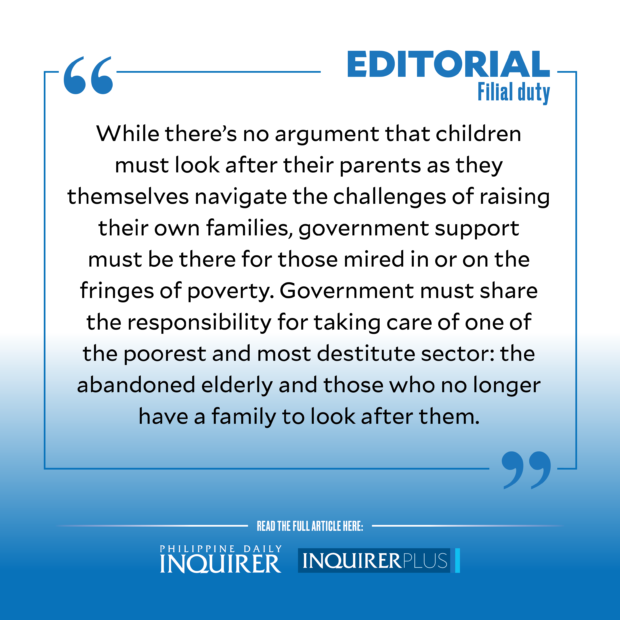Filial duty
A bill filed at the House of Representatives wants to make it mandatory for children to support their elderly parents, or risk going to prison.
House Bill No. 4050, or the proposed Criminalizing Deprivation of Support to Elderly and Indigent Parents Act, filed by Parañaque City Rep. Gustavo Tambunting asserts that it is the “duty of children to take care of their elderly, sickly, or otherwise incapacitated parents by providing criminal action for the enforcement of their rights for maintenance and support.”
It would require the offspring “within their means and capacity” to maintain support for their parents who may be over 60 years old, or suffering from a disease or disability and unable to support themselves. Support includes “everything indispensable for sustenance, dwelling, clothing, and medical attendance.”
Parents deprived of support by their children can seek help from the Department of Social Welfare and Development (DSWD) in filing a criminal complaint. Those found guilty could be fined from P200,000 to P500,000 and face imprisonment of up to six months.
For a nation and people known for close family ties, Tambunting’s bill seems superfluous, if not insulting. After all, love and devotion to parents, children, grandparents, and the extended family best comes from the heart and should be freely given. Do we really have to legislate filial duty?
In pushing the bill, Tambunting cited the report of the Commission on Human Rights (CHR) raising concern about the increasing cases of abuse, neglect, and abandonment of the elderly in the country, and the lack of data to determine the extent of the problem.
In June 2020, during the World Elder Abuse Awareness Day, then CHR Commissioner Karen Dumpit said: “Elder abuse, despite its seriousness, is an invisible issue in the Philippines.” Data on abused elderly persons are hardly available due to underreporting and limited research, she added.
The last study conducted on this issue was back in 2004, Dumpit said. In the study conducted among urban poor communities, it was found that some 40 percent of older respondents said they experienced maltreatment, ranging from physical and verbal abuse, ridicule, discrimination, and neglect, often from their children and other family members.
But only 2 percent reported the abuse to authorities, 11 percent turned to other family members for support, while 21 percent did not seek help or refuge.
“We all need to be aware of elder abuse, recognize its early signs, know how to find help, and report them to the proper authorities,’’ Dumpit said. “Exposing any form of abuse may well be the last thing that can save a life,” she added.
Former senator Panfilo Lacson filed a similar bill in 2016, titled the “Parents Welfare Act,” contending that such a measure would strengthen the Filipinos’ well-known sense of filial responsibility.
While there’s no argument that children must look after their parents as they themselves navigate the challenges of raising their own families, government support must be there for those mired in or on the fringes of poverty. Government must share the responsibility for taking care of one of the poorest and most destitute sector: the abandoned elderly and those who no longer have a family to look after them.
As it is, there are only four homes for the elderly managed by the government, which are found in Quezon City, Rizal, Davao City, and Zamboanga City. In his bill, Lacson had proposed the establishment of similar shelters for the elderly in every city and municipality.
More responsive laws, reflecting the current harsh economic reality, are also needed to provide resources for the care of the elderly. In 2019, the House unanimously passed HB 7030, or the Anti-Elder Abuse Act, providing more benefits for the elderly, but its counterpart in the Senate was stuck in the committee level.
Not only should the government provide interventions for the abandoned elderly, but it must offer better provisions for senior citizens as well, including retirement homes and a more substantial pension as they leave the work sector.
This has become a moral imperative given findings that the Philippine population is aging fast. In August, the Commission on Population and Development (Popcom) cited data from the Philippine Statistics Authority showing the percentage of older Filipinos rising to 8.5 percent in 2020, from 5.9 percent a decade ago. Meanwhile, the younger population of Filipinos under 15 years significantly declined to 30.7 percent in 2020, from 37 percent in 2000.
In 2019, the Popcom also reported that 55 percent of senior citizens had no pension, putting them automatically in the category of persons living in poverty.
As families gather to honor the memory and sacrifices of their dearly departed, it is also a time to reflect on the business of the living, especially our family members who are in the twilight of their lives and deserve love, care, and devotion, while they are still very much with us.





















